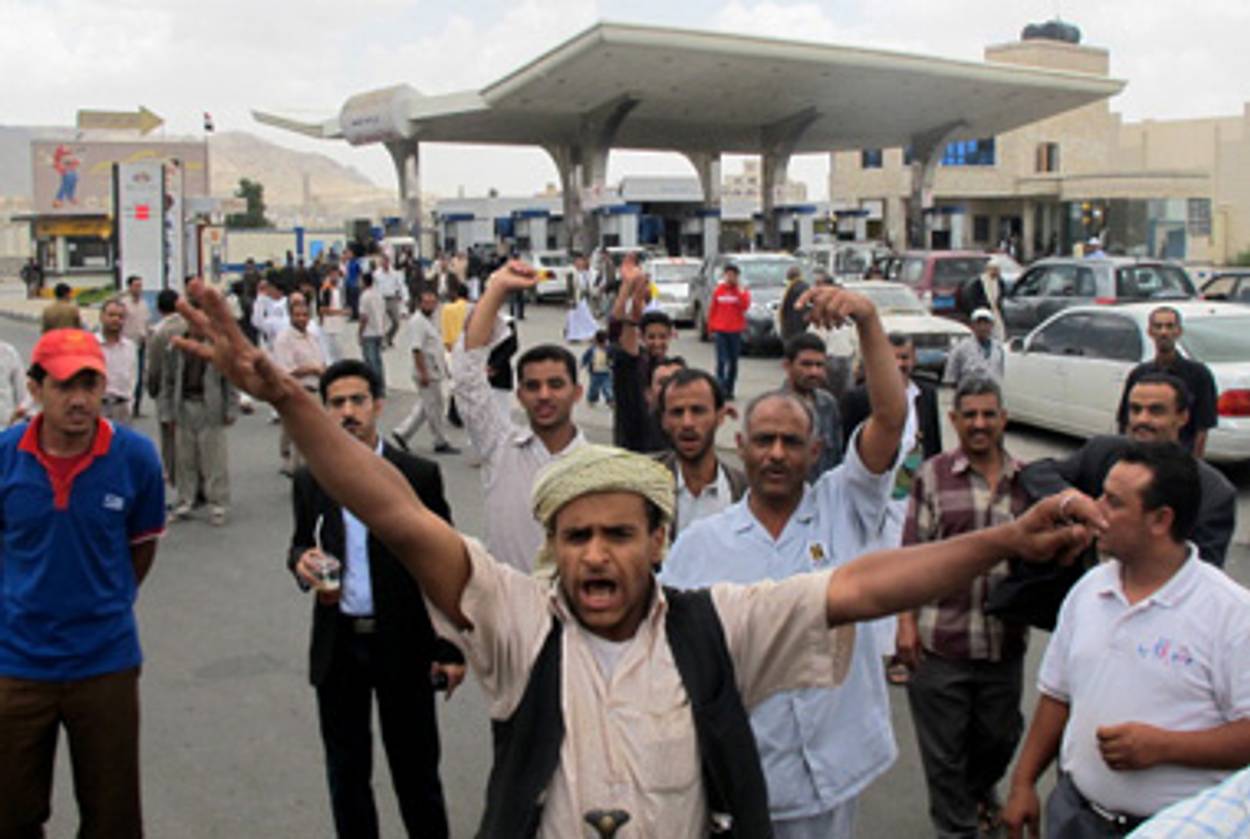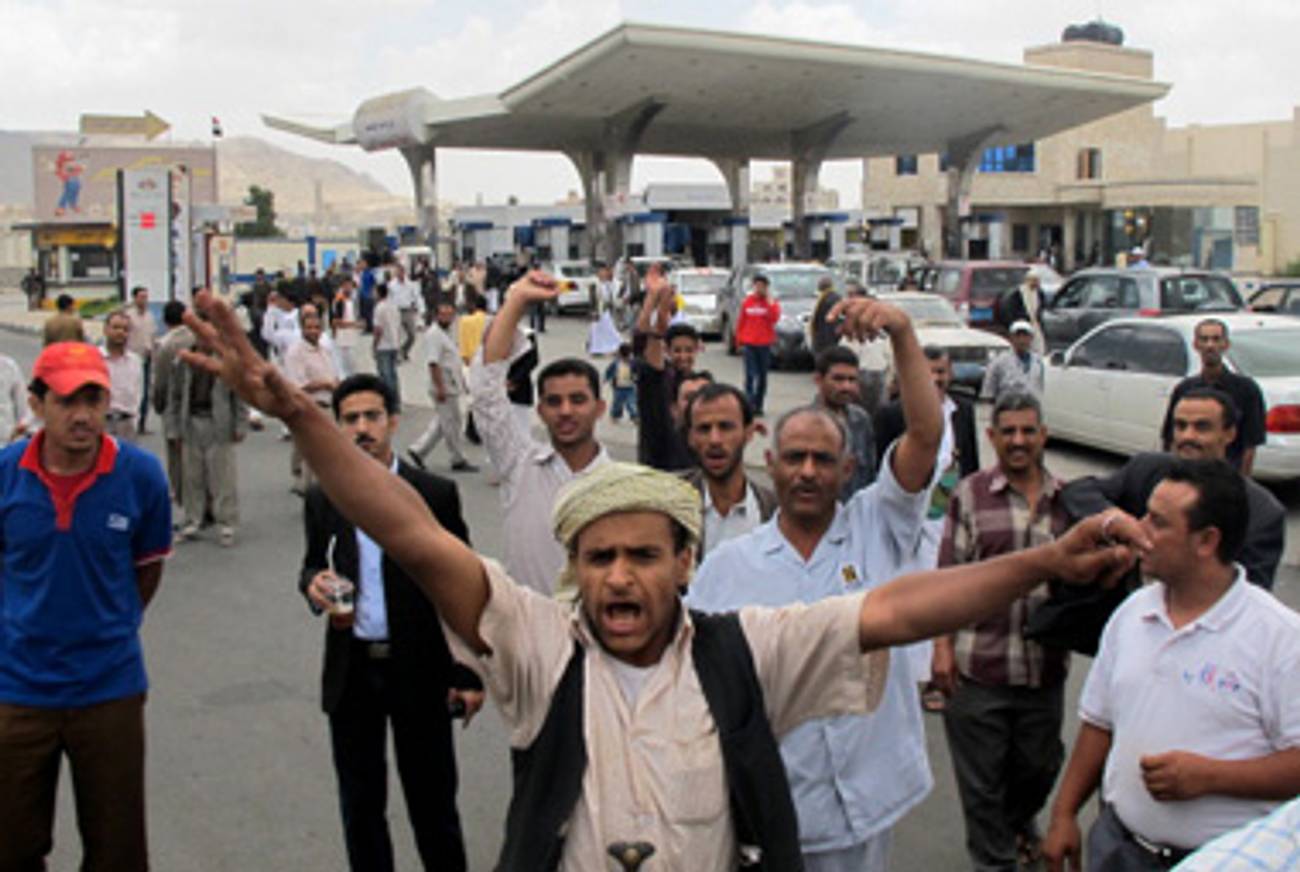Spring Break
As the oil-poor Arab states of Egypt, Tunisia, Syria, and Yemen face food and fuel shortages in the aftermath of upheaval there, Israel stands to emerge with an even stronger position in the region




Diesel fuel is scarce at filling stations, and people line up for hours to buy a couple of jerry cans. Gang members infest the queues, sometimes scaring away other customers with knives and pistols, and sometimes killing them, while the police are nowhere to be found. Farmers can’t fuel their tractors and harvesting machines, leaving wheat crops at risk. Rice is also scarce, and the press alleges that corrupt officials are selling it by the container-load to overseas buyers. The price of food jumps every week. A lot of people are hungry, and everyone is very scared.
That is daily life in post-Mubarak Egypt, as reported by Arab-language online media and bloggers last week. It’s not much different from the economic breakdown I witnessed after civil wars in Central American banana republics, with one big difference there—namely the bananas, which meant that no one starved when economies disintegrated. But the Egyptians and Syrians are desperately short of food and can neither produce it nor earn the means to pay for it.
Israel’s security position surely benefits in the long-term from the weakening or even the collapse of its chief military opponents among its Arab neighbors. Tactically, some observers point to a risk that the beleaguered Syrian regime might strike Israel to distract attention from its internal problems. But a case can be made that after civil unrest in Syria and political upheaval in Egypt, those countries are less prepared to strike Israel than at any time in the past 50 years. While the Western media trumpets the anodyne Bush-era fantasy of a forward-looking Arab world overthrowing outmoded autocrats in favor of Western-style democracy via Facebook and Twitter, the Arab world seems headed toward an abyss.
Severe food shortages were spreading in Syria, the U.N. Food and Agricultural Organization reported in May, even before the phrase “civil war” became endemic in Western press reports about that country. Syrian protesters now appear able to inflict significant casualties on government forces, and some Syrian units reportedly have refused orders to fire on demonstrators. Even where the Arab Spring has not decayed into civil war, as it has in Yemen and Libya, and threatens to in Syria, the revolts that toppled or threaten autocracies from North Africa to Yemen threaten to dissolve the remains of civil society.
The Obama Administration and other Western governments have acknowledged the depth of the Arab disaster, proposing a massive rescue package. The International Monetary Fund declared late last month that the Middle East and North Africa would require $160 billion in financial support during the next three years—more than Egypt’s total import bill over the period and two-fifths of its GDP. The IMF itself proposes to kick in $35 billion, the first time that institution has proffered money without knowing to what government and under what conditions it will be lent. And the Group of Eight industrial nations, meeting in France, announced a $40 billion aid package for Egypt and Tunisia, without stating where the money will be found or whether thrift-minded legislatures will provide it.
Staggering as these numbers seem, they are not an exaggeration: Egypt is short about $25 billion a year, and it is doubtful that Western governments will pick up that tab for long. Canadian Prime Minister Stephen Harper declined to commit funds to the G-8 support package, and Republicans in the United States Congress have already questioned the wisdom of throwing money into countries whose governments may come under the control of anti-American Islamist radicals.
Of all the foreign aid programs ever put forward by major governments, this latest aid package seems perhaps the least likely to succeed, even if Western governments do decide to pay for it. After the fall of Communism in 1989, Western governments announced $40 billion to $70 billion worth of transition aid to post-communist countries, but barely a tenth of the promised aid was actually disbursed in the peak year of 1992. The IMF and G-8 announcements reflect a belated, panicky acknowledgment on the part of Western governments that everything is about to go very wrong.
The Arab countries’ economic problems are incomparably worse than those of the post-communist world. Russia, the world’s largest oil producer, was largely self-sufficient in food and held its own in high-tech military competition with the United States until the 1980s. Prior to the fall of Communism, Eastern Europe was literate, urban, and industrial.
A 2009 World Bank report on Arab food security warned: “Arab countries are very vulnerable to fluctuations in international commodity markets because they are heavily dependent on imported food. Arab countries are the largest importers of cereal in the world. Most import at least 50 percent of the food calories they consume.”
Two-fifths of Egyptians can’t read. Egypt imports half its wheat, the staple food commodity. More than nine-tenths of married Egyptian women have suffered genital mutilation. Three out of 10 marriages in Egypt unite first or second cousins, reinforcing clan loyalties. The only institution of national cohesion is the army, but the army itself is at risk. “After the humiliation of [former President Hosni Mubarak],” a former U.S. Secretary of State remarked in a private think-tank briefing, “the generals know that they can be brought down by street demonstrations.” The military-business clique that ran the country for 60 years under Gamal Abdel Nasser and then Mubarak is fleeing, taking whatever they can with them.
The Facebook activists of Tahrir Square became the revolution’s poster boys, but very few of them have jobs, or will ever get them. Egypt’s new finance minister, Samir Radwan, told the Financial Times in February: “I’m generalizing, but a large number of the Egyptian labor force is unemployable. The products of the education system are unemployable.” Of Egypt’s 700,000 university graduates, a tiny percentage lands a job with outfits like Google, as activist and Mubarak opposition leader Wael Ghonim did after studying at the American University in Cairo. (He has spent the last few weeks in the United States signing book deals and receiving awards.)
Four months into its revolution, Egypt displays the symptoms of social disintegration last seen in Russia after the fall of Communism or in Nicaragua in the last days of the Sandinista regime. I observed both, as an adviser to Boris Yeltsin’s finance ministry and to President Violeta Chamorro after she won Nicaragua’s presidential election in 1990. But there’s a deadly difference between Egypt, Syria, Tunisia, and Yemen and past episodes of economic chaos: The poor Arab states have been at the brink of a food crisis for years, and the doubling of world food prices during 2010 pushed them over the edge. The revolts, in part a response to the food crisis, have made matters irreparably worse.
The chain of food distribution has broken down for several reasons: a lack of money, theft and hoarding of available food stocks, and a battle for control of food supplies between a welter of government and private entities. Mobs, in the form of “revolutionary committees,” are attacking shops whose owners “charge more than the price prescribed by law,” the Federation of Egyptian Radio and Television reported. The Ministry of Solidarity and Social Justice warned of “thugs” in control of bread and fuel, raising bread prices far in excess of the 11.5 percent inflation reported for April by the country’s central bank. The price of some items, including sugar and cheese, has doubled in some urban markets in the past two months. Reuters reported last month that the country lost $6 billion of official and $7 billion of unofficial reserves, and had only $24.5 billion on hand at the end of April.
Egypt’s social structure—with two-fifths of the country mired in extreme rural poverty and another quarter starving on thin subsidies in Cairo and Alexandria—simply is not viable. Like many Third World autocracies, Egypt suppressed agricultural productivity in order to keep half its population barefoot, illiterate, and down on the farm. Once the breadbasket of the Mediterranean, Egypt’s wheat yield is now a fifth of that produced in the United States. It cannot feed itself.
Egypt is in an economic trap without an exit. Syrian President Bashar al-Assad made a few tentative steps toward reform and ended up with 100,000 dispossessed farmers living in tent cities around Damascus. Other developing economies have had better luck than the hapless Syrians. Mexico pursued the same policy of rural impoverishment for half a century and solved it by shipping a fifth of its people to the United States—and Mexico is an oil-exporting country that is roughly self-sufficient in food and has substantial industry.
Some Israeli commentators fear that an American embrace of post-authoritarian Arab regimes might leave Israel isolated. “The United States, it may be assumed, will make every effort to strengthen its hold on the region following the regime changes,” wrote Haaretz Middle Eastern affairs analyst Zvi Bar’el this week. “If Israel does not change its policy after the dust settles in the region and does not help the United States be the power in the region, it will be categorized as suspicious, if not an outright enemy.” The trouble is that U.S. dollars and defense capability may not be able to stabilize any of these countries. Fractious societies beset by sectarian and tribal divisions generally have murderous authoritarian regimes for a reason. Egypt, Tunisia, Syria, and Yemen—the oil-poor Arab states—simply can’t get there from here. They have no resources, no qualified manpower, no infrastructure, and no civil institutions.
A more probable direction for U.S. foreign policy in the Middle East is the one suggested by Prime Minister Benjamin Netanyahu in his speech to a joint session of the U.S. Congress last month, namely that Israel will be perceived as the “one anchor of stability” and “America’s unwavering ally” in “an unstable Middle East.” Israel’s security position may show a sudden and drastic improvement. Irregular forces have been shooting at Israel since 1982, when Israel invaded southern Lebanon to prevent such attacks, and the irregulars always have relied on the implicit backing of the regular armies of Syria and other countries. With the Syrian army busy killing protesters, Hezbollah is less likely to provoke an Israel military response. Iran’s capacity to reach into Lebanon, for that matter, is constrained by the chaos in Syria.
While Egypt may back away from its peace treaty with Israel, the state of readiness of its military is deteriorating with the continued economic crisis and disruption of the chain of command, starting with the fall of Mubarak, its former commander-in-chief. Unlike 1973, when the Egyptian army depended on Soviet arms and tens of thousands of Soviet advisers, Egypt depends on American weapons and corresponding support, and it is highly unlikely that the Pentagon would assist Egyptian aggression against Israel by resupplying Egypt after an initial attack. And if the Muslim Brotherhood comes to power in Egypt, the U.S. Congress will make it hard for Washington to provide any sort of aid to Egypt at all.
With the regular armies of present and former enemies paralyzed, Israel is in a far better position to neutralize irregular forces. It may therefore emerge from the Arab upheaval with a stronger position in the region than at any time in its history.
David P. Goldman, Tablet Magazine’s classical music critic, is the Spengler columnist for Asia Times Online, Senior Fellow at the London Center for Policy Studies, and the author of How Civilizations Die (and Why Islam Is Dying, Too).
David P. Goldman, Tablet Magazine’s classical music critic, is the Spengler columnist for Asia Times Online, Washington Fellow of the Claremont Institute, and the author of How Civilizations Die (and Why Islam Is Dying, Too) and the new book You Will Be Assimilated: China’s Plan to Sino-Form the World.